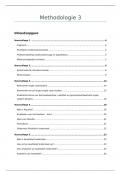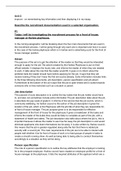What is Religion?
Definition and Characteristics
Etymologically speaking, the term religion comes from the two Latin words re, which
means “again”, and lig, which means “join” or “connect”. Thus, the common translation
of the term religion is “to join again” or “to reconnect”. For this reason, according to
Michael Molloy (2013), the term religion suggests the joining of our human world to the
sacred world. This is in-line with Judith Huxley’s definition of “religion” as a way of life
founded upon the apprehension of sacredness in existence.
According to Molloy, in classical Latin, religio meant awe for the gods and concern for
proper ritual. However, it must be noted that it was the Western world that popularized
the term religion. For this reason, according to Molloy, it is not appropriate to apply the
term religion across cultures. Thus, Molloy suggests that using the term “spiritual path”
is a more fitting designation to refer to other religious systems.
Traditionally, however, scholars define religion as a system of beliefs that involves the
worship of a God or gods, prayer, ritual, and a moral code. It must be noted, however,
that this definition may not necessarily apply to other religions and may be insufficient
for some scholars. So, instead of “defining” religion, which means putting a limit to the
term religion (in fact, “definition” comes from the Latin word de-finire, which means to
set the limits of something), it is much safer to “describe” it in our attempt to make
sense of what it really is. And the best way to describe religion is to articulate its key
elements or characteristics.
Foremost of these key elements is “belief system”. When we say belief system, we are
specifically referring to the “worldview” of a particular group of people. Hence, a belief
system refers to a fairly complete and systematic interpretation of the world (or
universe) and the human persons’ place and role in it. This explains why in any kind of
religion, there is always the dynamic relationship between the world and humans.
Think, for example, of how Taoism highly values “Nature”, or how the adherents of
Zoroastrianism worship the Sun.
The second important element of religion is “community”. For sure, a religion always
involves a group of people who showed the same belief system and practiced the ideals.
Needless to say, a certain religion cannot be called “religion” in the strict sense of the
word if it doesn’t have a community of believers. As a matter of fact, some religions,
such as Islam and Protestantism, are too aggressive in expanding its membership.
Definition and Characteristics
Etymologically speaking, the term religion comes from the two Latin words re, which
means “again”, and lig, which means “join” or “connect”. Thus, the common translation
of the term religion is “to join again” or “to reconnect”. For this reason, according to
Michael Molloy (2013), the term religion suggests the joining of our human world to the
sacred world. This is in-line with Judith Huxley’s definition of “religion” as a way of life
founded upon the apprehension of sacredness in existence.
According to Molloy, in classical Latin, religio meant awe for the gods and concern for
proper ritual. However, it must be noted that it was the Western world that popularized
the term religion. For this reason, according to Molloy, it is not appropriate to apply the
term religion across cultures. Thus, Molloy suggests that using the term “spiritual path”
is a more fitting designation to refer to other religious systems.
Traditionally, however, scholars define religion as a system of beliefs that involves the
worship of a God or gods, prayer, ritual, and a moral code. It must be noted, however,
that this definition may not necessarily apply to other religions and may be insufficient
for some scholars. So, instead of “defining” religion, which means putting a limit to the
term religion (in fact, “definition” comes from the Latin word de-finire, which means to
set the limits of something), it is much safer to “describe” it in our attempt to make
sense of what it really is. And the best way to describe religion is to articulate its key
elements or characteristics.
Foremost of these key elements is “belief system”. When we say belief system, we are
specifically referring to the “worldview” of a particular group of people. Hence, a belief
system refers to a fairly complete and systematic interpretation of the world (or
universe) and the human persons’ place and role in it. This explains why in any kind of
religion, there is always the dynamic relationship between the world and humans.
Think, for example, of how Taoism highly values “Nature”, or how the adherents of
Zoroastrianism worship the Sun.
The second important element of religion is “community”. For sure, a religion always
involves a group of people who showed the same belief system and practiced the ideals.
Needless to say, a certain religion cannot be called “religion” in the strict sense of the
word if it doesn’t have a community of believers. As a matter of fact, some religions,
such as Islam and Protestantism, are too aggressive in expanding its membership.










